They're calling it the "plátanito protest." Janitors with bananas taped to purple union shirts are marching in the streets of downtown Miami this afternoon to protest low wages and working conditions in an industry rife with abuse and intimidation.
In Miami, where janitorial wages are among the lowest in the nation, the weekend news of a duct-taped banana selling for $120,000 at Art Basel didn't go over well. In fact, to janitor Felipa Cardenas, it was almost obscene.
"How much are we worth? A banana is worth more than us, apparently," says Cardenas, who earns $8.46 an hour cleaning a luxury office building in downtown Miami. "Our work is something people don't value; they look at us like we're nothing. But it's a job with dignity, and it's tough work. We deserve better payment."
Miami City Commissioner Ken Russell and Miami-Dade County Commissioner Jean Monestime showed up at the march, which organizers say has around 50 people in attendance.
For Cardenas, who had to finish a morning cleaning shift before joining the protest, the choice to march wasn't much choice at all. Cardenas says her salary isn't enough to cover her rent or utility bills, never mind Christmas presents for her grandchildren. She's not alone in her struggles.
Nearly 60 percent of subcontracted janitors in the Miami area live near or below the federal poverty level, and roughly 70 percent of them spend more than a third of their paychecks on rent, according to a recent report from the University of California-Los Angeles' Center for Neighborhood Knowledge.
The report, which was commissioned by the Service Employees International Union (SEIU), found that Miami's median janitorial wage of $8.50 per hour ranks dead last among large metropolitan areas in the nation when factoring in the cost of living. By comparison, janitors in similarly expensive cities, such as Chicago and Seattle, make $3.56 more on average.
These sagging salaries remain despite the fact that it's low-wage service sector positions such as janitorial work — not booming real-estate developments or burgeoning startups — that have seen the steepest rise in new jobs in the Miami areas in recent years.
Among the throng of janitors gathering on Biscayne Boulevard is Maria Galindo, who was recently fired from her position as a janitor with the Hialeah Gardens-based cleaning contractor SFM Services. Galindo, who was recently profiled by the Miami Herald, believes her union involvement was the real cause of her termination. Now she's left without a job and no ability to provide for her two sons, one of whom has special needs.
Today's march will stop at buildings cleaned by SFM Services as well as sites cleaned by contractors Pritchard Industries and CRS Facility Services, where Cardenas now works. Employees say these companies don't pay livable wages or provide benefits such as healthcare and paid sick leave.
The construction boom in Miami has coincided with a rise in the use of low-bid cleaning contractors by office buildings happy to outsource their cleaning work, according to Ana Tinsly, a spokeswoman for the Florida division of 32BJ SEIU, which represents more than 1,200 janitors in the area. The UCLA report showed that an estimated 30 percent of janitors in South Florida are subcontracted and that nearly 90 percent of large office buildings outsource cleaning jobs to contractors that stifle wages and benefits to gain new clients.
"The plátanito protest is to illustrate the absurdity of someone spending tens of thousands on a banana taped to a wall in a city where janitors earn so little they can't afford to feed their families," Tinsly says. "Miami should not be a playground for the rich; it should be a place where all residents can earn a decent living and raise their families."
The protest is the latest in an extended campaign by organizers with SEIU 32BJ to draw attention to the plight of janitors and build solidarity within a largely nonunion industry. In October, SEIU 32BJ helped janitors file unfair labor practice charges against two other cleaning contractors.
[
{
"name": "Air - MediumRectangle - Inline Content - Mobile Display Size",
"component": "19274298",
"insertPoint": "2",
"requiredCountToDisplay": "2"
},{
"name": "Editor Picks",
"component": "17482312",
"insertPoint": "4",
"requiredCountToDisplay": "1"
},{
"name": "Inline Links",
"component": "18711090",
"insertPoint": "8th",
"startingPoint": 8,
"requiredCountToDisplay": "7",
"maxInsertions": 25
},{
"name": "Air - MediumRectangle - Combo - Inline Content",
"component": "17482310",
"insertPoint": "8th",
"startingPoint": 8,
"requiredCountToDisplay": "7",
"maxInsertions": 25
},{
"name": "Inline Links",
"component": "18711090",
"insertPoint": "8th",
"startingPoint": 12,
"requiredCountToDisplay": "11",
"maxInsertions": 25
},{
"name": "Air - Leaderboard Tower - Combo - Inline Content",
"component": "17482313",
"insertPoint": "8th",
"startingPoint": 12,
"requiredCountToDisplay": "11",
"maxInsertions": 25
}
]














